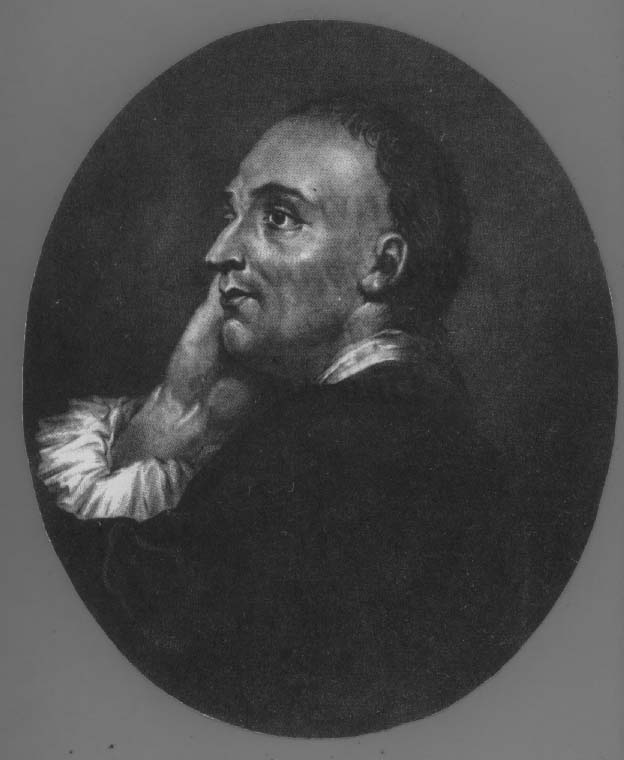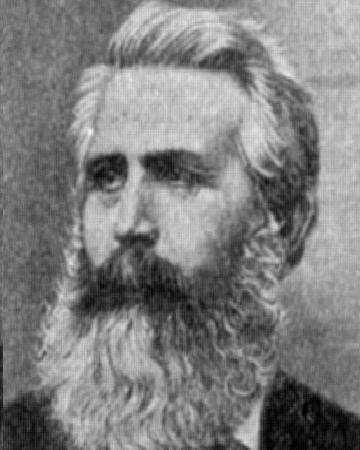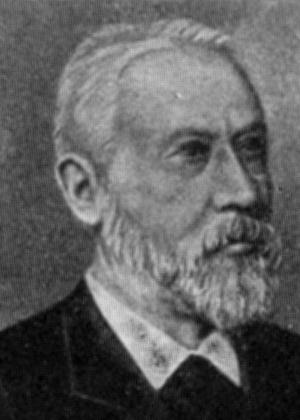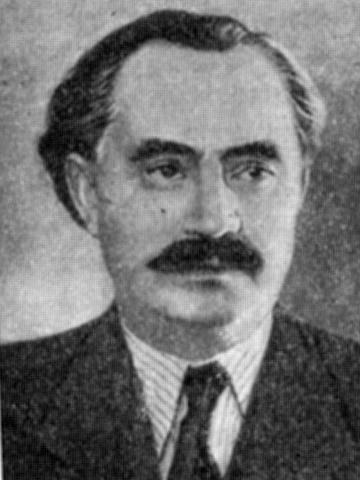Di
Diderot, Denis (1713-1784)
 Philosopher of the French Enlightenment; publisher of Encyclopedie; materialist in teaching on Nature, psychology and theory of knowledge; promoted some elements of dialectics (inter-connection of all processes of Nature, eternal change of form) and pointed to role of growth of technology in the development of thought and cognition.
Philosopher of the French Enlightenment; publisher of Encyclopedie; materialist in teaching on Nature, psychology and theory of knowledge; promoted some elements of dialectics (inter-connection of all processes of Nature, eternal change of form) and pointed to role of growth of technology in the development of thought and cognition.
Denis Diderot's comtemporaries in the Paris of Louis XV and XVI were Voltaire, Rousseau, Condillac, d'Alembert, Condorcet, Montesquieu, Gassendi, Fontonelle, Buffon, d'Holbach, Helvetius and others - the brilliant young philosophers who made up the movement of the Enlightenment, who were laying the philosophical basis for the great French Revolution.
Diderot died before the Revolution took place, but in Engels' words: "If ever anybody dedicated his whole life to the 'enthusiasm for truth and justice' - using this phrase in the good sense - it was Diderot".
Diderot was the son of a cutler, chosen for the Church, but he abandoned the clergy for writing and philosophy, leading a bohemian lifestyle, always on the verge of starvation, one step ahead of the police, dodging the censors, in an atmosphere of fervent political and philosophical debate. In the words of police spy, Diderot was "a clever fellow, but extremely dangerous"
Diderot eked out a living as a translator. As luck would have it, his publisher gave him the job of translating Chambers Encyclopaedia into French, and this project he transformed into his life-work. Diderot mobilised his friends and associates to gather together a work which summarised the achievements of the science and industry of the time and would act as a beacon for the overthrow of feudalism, clerical obscurantism and backwardness. Catherine II of Russia purchased Diderot's library from him, in order to safeguard his books from the police.
Diderot's philosophical contemporaries were, in Germany, Immanuel Kant (Kant's "critical" works begin from 1770) and in England, the sceptic David Hume. The influence of Locke is detectable in his views.
Diderot's work on the Encyclopaedia took him into every branch of science and every trade, and Diderot did not just dabble, but entered into and mastered each of the Arts he investigated. Natural science was at a very early stage of its development in his time. Newton and Leibniz has raised the science of mechanics to a very high level of perfection, but otherwise ... Lavoisier, the discoverer of oxygen and the explanation of burning, was Diderot's contemporary as was Voltaire, the discoverer of electrical force. In Sweden Carolus Linnaeus was categorising plants and animals for the first time. The concept of molecule had not been discovered. Most of the branches of science known to us today only came into being during he seventy years after his death. Under these circumstances, the profundity and self-confidence with which Diderot puts forward his materialist view of the relation of thought and matter, of the interconnection of living and inorganic matter, of the evolution of the Universe - is astounding.
Dietzgen, Joseph (1828-88)
 An entirely self-educated worker (his primary skill was as a tanner) who independently created dialectical materialism shortly after Marx & Engels. When he discovered the volumuous works of Marx and Engels, he become one of their most steadfast supporters.
An entirely self-educated worker (his primary skill was as a tanner) who independently created dialectical materialism shortly after Marx & Engels. When he discovered the volumuous works of Marx and Engels, he become one of their most steadfast supporters.
Dietzgen's main philosophical contributions to Marxism was the thorough an exposition of epistomology. He explained consciousness as an ideal product of matter (which he saw as eternally existing and moving, calling it the "universum"). He explained that natural and social being is the content of consciousness. Cognition, he went on, proceeds in sensory and abstract forms as a process of motion, from relative to absolute truth. This cognition he saw was an image of the world verified by that person's experiences.
Dietzgen lived and worked in Germany, Russia, and the United States. He was strongly influenced by Feuerbach early on and was a militant atheist.
Further Reading: Joseph Dietzgen Internet Archive
Dilthey, Wilhelm (1833 - 1911)
 The founder of Descriptive Psychology, Dilthey was an opponent of British empiricism and the positivism of people like Comte and Spencer. Dilthey argued for methods in the human sciences distinctly different from that of the natural sciences, and that Psychology should be the foundational science for all the human sciences.
The founder of Descriptive Psychology, Dilthey was an opponent of British empiricism and the positivism of people like Comte and Spencer. Dilthey argued for methods in the human sciences distinctly different from that of the natural sciences, and that Psychology should be the foundational science for all the human sciences.
Dilthey objected to the pervasive influence of the natural sciences and developed a philosophy of life emphasising historical contingency. His ‘Philosophy of Life’ drew on Hegel’s Geist and pivoted on the notion of a living spirit which develops in historical forms. Dilthey was little known during his own lifetime, being rediscovered in post-World War One Germany, and is now widely recognised in cultural studies.
Dilthey was the son of a Reformed Church theologian, but after studying theology at Heidelberg and Berlin, he transferred to philosophy and after completing his Doctorate at Berlin and a short time as a school teacher, dedicated himself full-time to writing, and after appointments as Basel and Breslau, took up the position as Chair of Philosophy at the University of Berlin, where he spent the remainder of his life.
Dilthey’s aim was to find the philosophical foundations for what he called the “sciences of man, of society, and the state,” which he named Geisteswissenschaften, usually translated as “human sciences” - a term that eventually gained general recognition to collectively denote the fields of history, philosophy, religion, psychology, art, literature, law, politics and economics.
In 1883, the first volume of his “Introduction to Human Sciences” appeared but the second volume never appeared, only a series of essays including in 1894, “Ideas Concerning a Descriptive and Analytical Psychology.”
Against the dominant conception of his time, Dilthey opposed the idea that the human sciences should emulate the methodology of the natural sciences, and tried to establish the humanities as sciences in their own right. In his study of interpersonal experience, its realisation in creative expression, the reflective understanding of this experience, and the “logical development” that may be attributed to the development of knowledge and culture in social and historical processes, Dilthey developed important insights. He developed his “descriptive psychology,” mainly through the study of literature, and said of the psychology of his times: “Contemporary psychology is an expanded doctrine of sensation and association. The fundamental power of mental life falls outside the scope of psychology. Psychology has become only a doctrine of the forms of psychic processes, thus it grasps only a part of that which we actually experience as mental life.” Psychology needed to be based on an analysis of mental processes in real-life situations, rather than in a laboratory. Dilthey emphasised that the essence of human beings cannot be grasped by introspection but only from a knowledge of history; knowledge could never be final, because history is never final. Dilthey thus suggested, for the first time, a Cultural Psychology,
Dilthey held that the historical relativity of all ideas and institutions is the most characteristic and challenging fact in the intellectual life of the modern world. He was hostile to the construction of closed, rational systems and preferred to leave questions unsettled. This preference for leaving questions open, was perhaps the main contributing factor to his failure to be recognised in his own time. Only after the War, did the significance of the methodology of his historical philosophy of life come to be appreciated. Dilthey supervised Mead’s PhD studies.
Dimitrov, Georgi Mikhailovich (1882-1949)
 Born June 18, 1882, in Kovachevtsi, Bulgaria; died July 2, 1949, near Moscow, U.S.S.R.
Born June 18, 1882, in Kovachevtsi, Bulgaria; died July 2, 1949, near Moscow, U.S.S.R.
Long-standing leader of the Bulgarian Communist Party, returned to Bulgaria in November 1945 and began the statification of the Bulgarian economy; showed a degree of independence of Stalin, talking to Tito and the Rumanians of a South-east European socialist federation, and early in 1948 he was eased out of leadership by Stalin and died in July 1949.
A printer and trade union leader, Dimitrov led the Bulgarian socialist parliamentary opposition to the voting of national war credits in 1915, and he played a major role in the formation of the Bulgarian Communist Party in 1919. Imprisoned for sedation in 1918 after continual protest of the world war, shortly after his release he moved to the Soviet Union. By 1921 he was elected to the executive committee of the Comintern (Third International). Two years later he moved back to Bulgaria where he led a worker's revolt that was brutally crushed by the capitalist government. Sentenced to death, Dimtrov escaped from Bulgaria, and traveled to Germany. By 1929 in Berlin, Dimtrov was elected the head of the Central European section of the Comintern.
On February 27, 1933, the newly elected leader of the Nazi party, Adolf Hitler, convicted Dimtrov and scores of other Communists as responsible for setting fire to the German parliament building, the Reichstag. Dimitrov was arrested and put to trial at Leipzig. Dimitrov's agressive defense coupled with world-wide attention on the proceedings of the trial, caused the court to find him not guilty and he was released.
Dimtrov moved back to the USSR, where he was elected General Secretary of the Communist International. He would end up being the last general secretary of the Comintern (1935-1943), as it was extinguished by Stalin in 1943. Dimtrov played a strong role in the anti-Nazi movement, encouraging popular front movement's and directing Bulgaria's guerrilla resistance against its own Axis government. In 1945, after the military defeat of the Nazis and the following Bulgarian revolution, Dimitrov returned to Bulgaria and was immediately appointed Prime Minister of the newly created socialist government.
Assuming dictatorial control of political affairs, he constructed Bulgaria along Stalinist lines, and by 1946 proclaimed the formation of the Bulgarian People's Republic. Two years later, as a result of his lax adherence to the Kremlin, he was eased out of power in early 1948, and died one year later while visiting Moscow.
See: Dimitrov Reference Archive
Disraeli, Benjamin (1804-1881)
Tory leader of the petty-bourgeois. Led the opposition to Free Trade from 1846 to 1868. Introduced the Second Reform Bill in 1867, giving the vote to more prosperous urban workers. Prime Minister in 1868 and again 1874-80. Now favoured Free Trade and an aggressive imperialist foreign policy. Regarded as the second founder of the Conservative Party (after Peel), incorporating some social reforms into its programme to facilitate the expansion of industry and imperial trade. After military reverses in Afghanistan and South Africa his government was defeated in 1880.
Dissmann, Robert (1878–1926) .
Turner, leader at age of 22 of metalworkers’ union in Barmen-Elberfeld. In 1905 secretary of metalworkers’ union in Frankfurt-am-Main and of SPD (Sozialistische Partei Deutschlands, Social-Democratic Party) in Hanau in 1908. Candidate of left opposition for SPD (Sozialistische Partei Deutschlands, Social-Democratic Party) Executive in 1911. Joined opposition in 1914, member of USPD from its foundation. Chairman of metalworkers’ union in October 1919, leader of trade-union left opposition, broke with left Independents on issue of trade- union independence, and opposed before and during Halle Congress affiliation to Comintern. Stayed with rump USPD and in 1922, in alliance with Levi, unsuccessfully opposed return to SPD. In 1923 organised left opposition with Levi in SPD. One of leaders of Social-Democratic Left and trade-union leader, died of heart attack.
Dittmann, Wilhelm (1874–1954) .
Cabinet maker, member of SPD (Sozialistische Partei Deutschlands, Social-Democratic Party) in 1898, journalist in 1899, deputy in 1912. In opposition during War, particularly attacked censorship. Co-founder of USPD, had contact with the sailor Reichpietsch. Sentenced to five years imprisonment in a fortress after January 1918 strike. Amnestied in October, became People’s Commissar in November and December. Leader of USPD Right, returned to SPD (Sozialistische Partei Deutschlands, Social-Democratic Party) in 1922. In 1933 emigrated to Switzerland, where he remained until 1951.